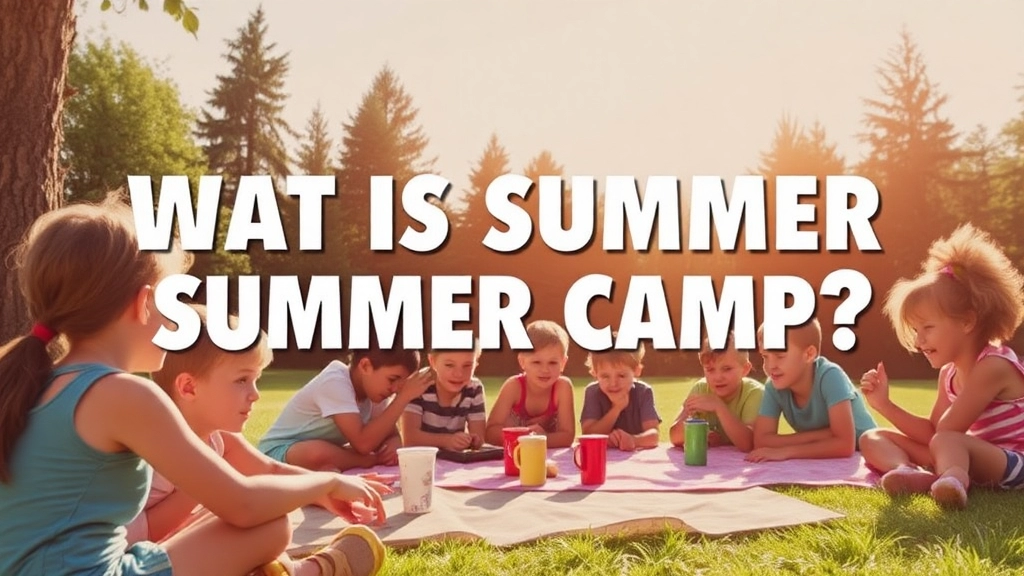What is summer camp?
This question might evoke images of campfires, cabins, and carefree days filled with fun. But there’s much more to it. In this article, we delve into the essence of summer camps, exploring their various types, activities, and the myriad benefits they offer. From traditional camps to specialized ones, the options are vast and tailored to different interests and needs. We’ll also guide you on how to choose the right camp, prepare for it, ensure safety, and manage costs. Whether you’re a first-time camper or a seasoned pro, this comprehensive guide has something for everyone.
Summer camp is more than just a break from the routine; it’s an opportunity for growth, learning, and unforgettable experiences. Imagine your child mastering a new skill, making lifelong friends, and gaining confidence—all while having the time of their life. We’ll cover everything from the essential packing list to safety measures, budgeting tips, and even advice for first-time campers. So, if you’re considering sending your child to camp, or just curious about what it entails, read on to discover why summer camp is an investment in their future and how to make the most of this incredible experience.
Definition of Summer Camp
Alright, let’s kick this off with a question: Have you ever wondered what exactly a summer camp is? If so, you’re in the right place. Summer camp â the two words that can either spark excitement or nerves, depending on who you ask. But what is it, really?
Summer Camp: The Basics
In the simplest terms, a summer camp is a supervised programme for children or teenagers conducted during the summer months. It’s a place where kids go to have fun, learn new skills, and make friends. Think of it as a temporary community where young people come together to engage in various activities, from sports and arts to science and adventure.
Why Do Summer Camps Exist?
Summer camps exist to provide a structured environment where kids can grow, learn, and have a blast while school’s out. They offer a break from the usual routine and a chance to try out new things. Whether it’s learning how to kayak, mastering a musical instrument, or just making s’mores by the campfire, summer camps are designed to keep kids engaged and active.
Types of Summer Camps
Now, you might be thinking, “Isn’t a summer camp just a summer camp?” Well, not quite. There are different types of summer camps catering to various interests and needs. But more on that later. For now, just know that whether your kid is into sports, arts, or tech, there’s likely a camp out there that’s a perfect fit.
The Essence of Summer Camp
At its core, summer camp is all about growth and experience. It’s about stepping out of comfort zones, building confidence, and creating memories that last a lifetime. It’s a place where kids can be themselves, discover new passions, and form friendships that often extend beyond the campgrounds.
Why It Matters
So, why should you care about summer camps? Simple. They offer a unique opportunity for kids to develop in ways they might not in their everyday lives. From social skills to independence, the benefits are numerous. And we’ll dive deeper into those benefits later on.
A Quick Recap
- Definition: A supervised programme for kids during summer.
- Purpose: Fun, learning, and personal growth.
- Types: Various, catering to different interests.
- Core Essence: Growth, experience, and lasting memories.
In the end, summer camp is more than just a break from school. It’s a chance for kids to explore, learn, and grow in a supportive and fun environment. So, if you’re considering sending your child to one, know that it’s more than just a way to keep them busy â it’s an investment in their future.
For a deeper dive into the variety of activities available, check out our Top Summer Camp Games and Activities Guide. Additionally, if you’re looking for ways to make the experience affordable, our Summer Camp Scholarships: Your Ultimate Guide can provide valuable insights.
Types of Summer Camps
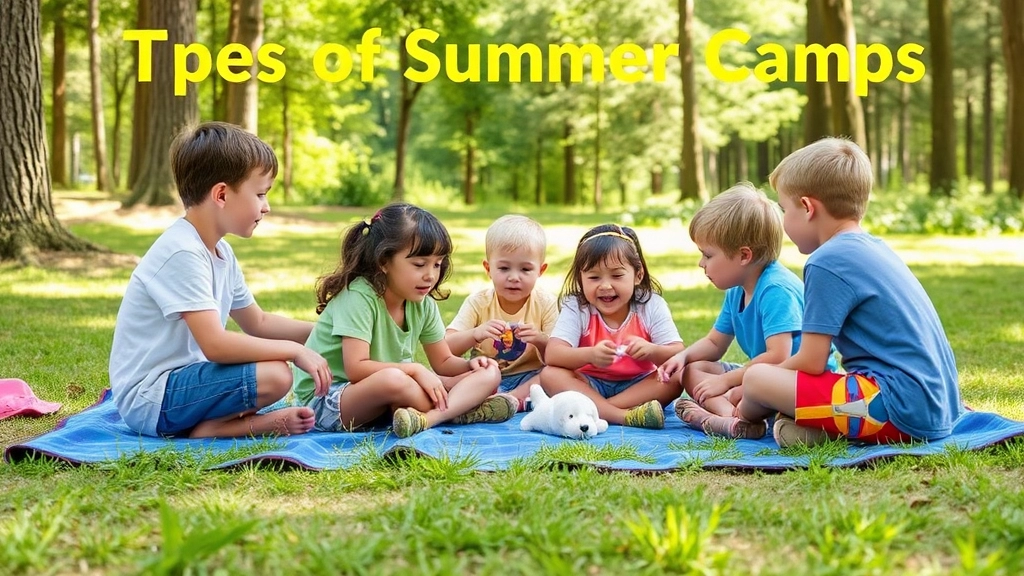
Wondering what kind of summer camp is right for you or your kids?
Let’s break it down.
Traditional Camps
These are your classic, all-around camps. Think of cabins, campfires, and canoeing. They offer a bit of everything: sports, arts and crafts, nature hikes, and team-building activities. Perfect for kids who want a taste of everything.
Specialised Camps
Got a budding artist or a future scientist? Specialised camps focus on specific interests.
- Arts Camps: Painting, drama, music, and dance.
- Science Camps: Robotics, coding, and experiments.
- Sports Camps: Football, basketball, swimming, and more.
These camps help kids hone their skills in a particular area.
Adventure Camps
For the thrill-seekers. Adventure camps include activities like rock climbing, white-water rafting, and zip-lining. Great for building confidence and resilience.
Academic Camps
Think of these as summer school, but way more fun. They focus on subjects like maths, science, and literature. Ideal for kids who love to learn or need a little extra help.
Day Camps
Not ready for overnight stays? Day camps offer all the fun activities but let kids return home each evening. Perfect for younger kids or those not quite ready for a full sleepaway experience.
Faith-Based Camps
These camps incorporate religious teachings and activities. They provide a spiritual environment alongside traditional camp fun.
Special Needs Camps
Designed for children with physical or developmental challenges. These camps offer specialised care and activities tailored to each child’s needs.
Family Camps
Want to join in on the fun? Family camps allow parents and kids to experience camp together. A great way to bond and create lasting memories.
Eco Camps
For the environmentally conscious. These camps focus on sustainability, conservation, and nature education. Kids learn about the environment while enjoying outdoor activities.
Why Knowing the Types Matters
Choosing the right type of camp can make or break the experience. Match the camp to your child’s interests and needs. Trust me, they’ll thank you for it.
Activities Offered at Summer Camps
Alright, let’s dive into the heart of what makes summer camps so awesome: the activities. When it comes to summer camps, the variety of activities offered can be mind-blowing. You might be wondering, “What will my child actually do all day at camp?” or “Will they be engaged and excited?” Let’s break it down.
Classic Camp Activities
First off, you’ve got your classic camp activities. These are the tried-and-true favourites that have been around forever, and for good reason. They’re fun, they’re engaging, and they’re a staple of any good summer camp.
- Swimming: Whether it’s in a lake, a pool, or even the ocean, swimming is a must. It’s perfect for cooling off on those hot summer days.
- Hiking: Exploring nature trails and getting some fresh air. It’s a great way to get kids moving and appreciating the great outdoors.
- Campfires: Think marshmallows, ghost stories, and sing-alongs. It’s the quintessential camp experience.
Adventure Activities
Now, if your kid’s a bit of a thrill-seeker, many camps offer adventure activities that will get their adrenaline pumping.
- Rock Climbing: Indoor or outdoor, it’s a fantastic way to build strength and confidence.
- Zip Lining: Flying through the air on a zip line is an unforgettable experience.
- Canoeing/Kayaking: Paddling through serene waters, learning teamwork and coordination.
Creative and Artistic Activities
For the budding artists and creators out there, summer camps also offer a range of creative activities.
- Arts and Crafts: From painting to pottery, there’s something for every artistic flair. Check out our fun summer camp crafts for kids for more ideas.
- Drama and Theatre: Putting on plays or skits, it’s a great way to build confidence and public speaking skills.
- Music and Dance: Whether it’s learning a new instrument or busting a move, these activities can be incredibly enriching.
Sports and Games
Sports are a big part of many summer camps, and they offer a great way for kids to stay active and learn new skills.
- Football, Basketball, and Volleyball: Team sports that teach cooperation and strategy.
- Archery: A unique skill that’s fun and challenging.
- Tennis: Perfect for those who like a bit of competition. Discover the top tennis summer camps to improve skills and confidence.
Educational Activities
Believe it or not, learning can be fun, especially at summer camp.
- Science Experiments: Hands-on activities that make learning exciting.
- Nature Studies: Learning about local flora and fauna, it’s like a mini biology lesson.
- Astronomy: Stargazing and learning about the night sky.
Specialised Camps
Some camps focus on specific interests, offering specialised activities that can be incredibly rewarding.
- Coding Camps: Perfect for tech-savvy kids who want to learn programming.
- Cooking Camps: For those who love to whip up something delicious.
- Language Camps: Immersive experiences for learning a new language.
Why These Activities Matter
You might be thinking, “Why does it matter what activities are offered?” Well, these activities do more than just fill the day. They help kids:
Benefits of Attending Summer Camp
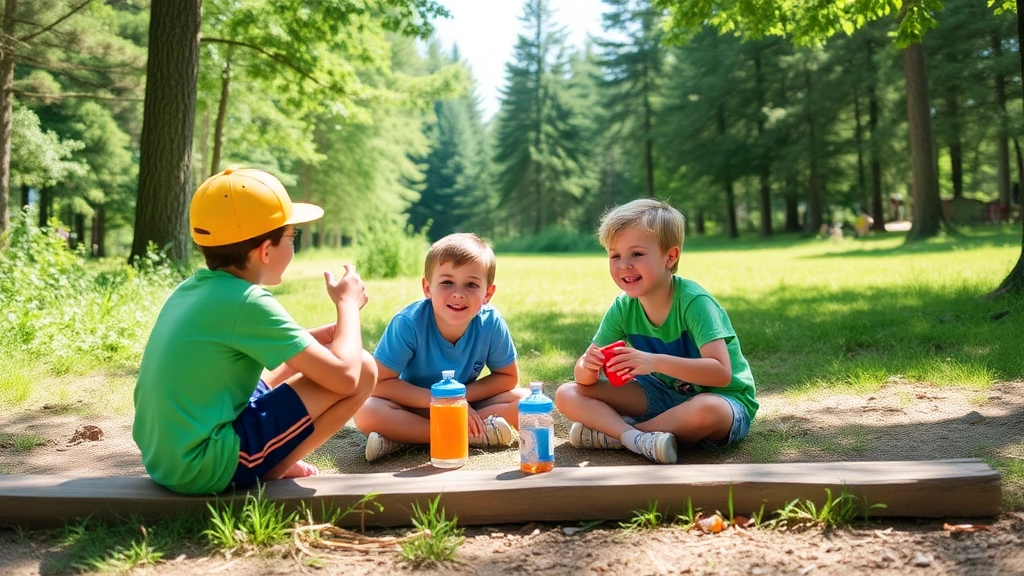
Ever wondered if summer camp is worth it?
Let’s break it down.
Why Summer Camp Rocks
First off, summer camp is more than just fun and games. It’s a place where kids grow. Seriously.
Real Benefits:
- Building Confidence
- Kids step out of their comfort zones.
- They try new things and crush it.
- Making Friends
- Camp is a social hub.
- Lifelong friendships are born here.
- Learning New Skills
- From archery to coding, there’s a skill for everyone.
- Hands-on learning beats classroom lectures any day.
- Independence
- Being away from home teaches self-reliance.
- They learn to pack their bags, manage time, and more.
- Physical Activity
- Camps get kids moving.
- Say goodbye to screen time and hello to outdoor fun.
Stories from the Campfire
Remember Sarah? She was shy, barely talked.
By the end of camp, she was leading the talent show. No joke.
The Real Deal
- Camps aren’t just for kids. Teens and even adults can benefit.
- Leadership camps, adventure camps, you name it.
- It’s a break from the usual. A reset button, if you will.
Why It Matters
- Mental Health: Fresh air and new experiences boost mood.
- Social Skills: Real conversations, not just texting.
- Resilience: Kids learn to handle challenges head-on.
How to Choose the Right Summer Camp
Are you worried about picking the perfect summer camp for your kid? You’re not alone. With so many options out there, it’s easy to feel overwhelmed. But don’t sweat itâI’ve got your back. Let’s break it down so you can make a choice that feels just right.
1. Know What You Want
First things first, what are you looking for? Is it a camp that focuses on sports, arts, or maybe something academic? Think about what your child enjoys and what skills they want to develop. Here’s a quick checklist to consider:
- Interests and Hobbies: Does your child love painting or playing football?
- Location: Close to home or a bit further away?
- Duration: A week-long adventure or a whole month?
- Budget: What’s your price range?
2. Types of Summer Camps
There are so many types to choose from. Here’s a quick rundown:
- Day Camps: Perfect for younger kids who aren’t ready for overnight stays.
- Residential Camps: Great for building independence.
- Specialty Camps: Focused on specific interests like coding or theatre.
- Adventure Camps: For the thrill-seekers who love the outdoors.
3. Research and Reviews
Do your homework. Read reviews and ask around. Talk to other parents and get their take on different camps. Websites and social media pages can give you a feel for the camp’s vibe.
4. Visit and Ask Questions
If possible, visit the camp. Check out the facilities, meet the staff, and get a sense of the environment. Here’s what to ask:
- Safety Measures: What’s their protocol for emergencies?
- Staff Qualifications: Who’s looking after your child?
- Daily Schedule: What does a typical day look like?
5. Consider Your Child’s Comfort
Think about your child’s personality. Are they social butterflies or do they prefer smaller groups? Some kids thrive in large settings, while others do better with more personal attention.
6. Budgeting for Summer Camp
Let’s talk money. Summer camps can vary widely in cost. Make sure you know what’s included in the fee and what extras might pop up. Some camps offer scholarships or discounts, so keep an eye out.
7. Trust Your Gut
At the end of the day, trust your instincts. You know your child best. If something feels off, it probably is. Choose a camp that aligns with your values and feels like a good fit.
Choosing the right summer camp doesn’t have to be stressful. With a bit of planning and these tips in hand, you’ll find the perfect spot for your child to make memories and learn new skills. For a comprehensive list of options, check out our Top Basketball Summer Camps 2024 Guide or explore Summer Camp Field Trips: Top Tips and Destinations for more ideas.
Preparing for Summer Camp
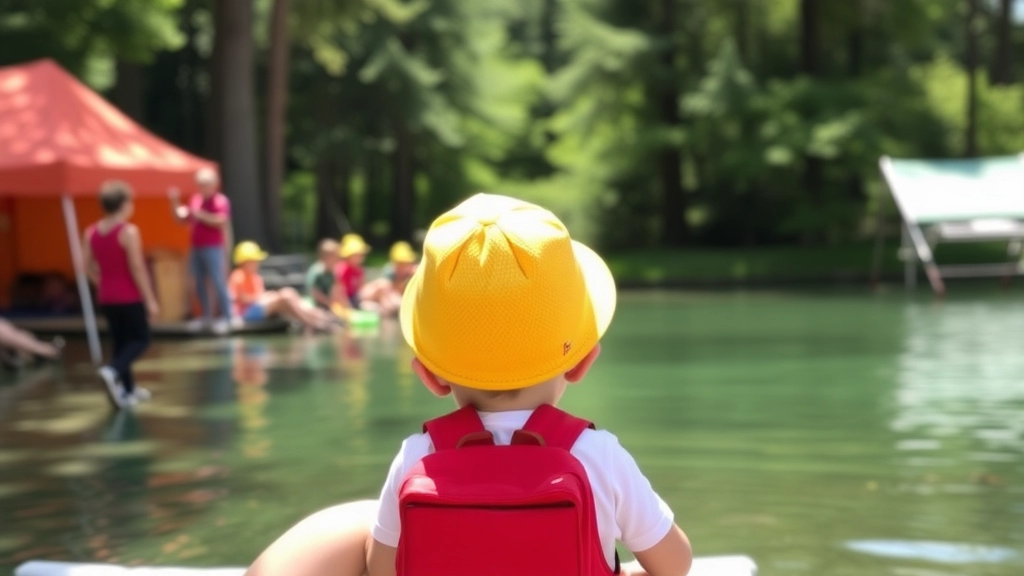
Worried about preparing for summer camp?
You’re not alone.
Many parents and kids feel the same way.
But don’t stress; we’ve got you covered.
Packing List Essentials
First up, let’s talk about what to pack.
You don’t want to overpack, but you also don’t want to forget the essentials.
Here’s a quick checklist:
- Clothing: Pack for all weather conditions; think layers.
- Toiletries: Toothbrush, toothpaste, soap, shampoo.
- Bedding: Sleeping bag, pillow, and maybe a blanket.
- Footwear: Comfortable walking shoes, flip-flops for showers.
- Swim Gear: Swimsuit, towel, goggles.
- Miscellaneous: Flashlight, water bottle, sunscreen, bug spray.
Label Everything
Trust me, you don’t want your stuff mixing up with someone else’s.
Label your clothes, toiletries, and even your shoes.
Health and Safety
Got allergies or medical conditions?
Make sure the camp staff knows.
Pack any required medications and provide clear instructions.
Mental Prep
Summer camp is a blast, but it can also be a bit daunting.
Here’s how to mentally prepare:
- Talk about it: Discuss what to expect with your kids.
- Visit the camp: If possible, do a pre-camp visit.
- Stay positive: Encourage excitement and curiosity.
Communication Plan
How will you stay in touch?
Some camps have strict rules about phone use.
Find out the camp’s policy and plan accordingly.
Practice Independence
Camp is a great time for kids to gain independence.
But a little practice beforehand can help.
- Chores: Get your kids used to doing simple tasks on their own.
- Packing: Let them help pack their own bags.
- Decision-Making: Encourage them to make small decisions daily.
Final Checklist
Before you head out, double-check your list.
Make sure you’ve got everything packed and labelled.
Ensure all medical forms and permissions slips are filled out.
Got more questions or need more tips? Check out our other sections on How to Choose the Right Summer Camp and Safety and Supervision at Summer Camps.
Let’s make this summer unforgettable!
Safety and Supervision at Summer Camps
Alright, let’s talk about the big one: safety and supervision at summer camps. If you’re a parent, you’re probably asking, “How safe is this camp?” and “Who’s watching my kid?” These are legit concerns, and trust me, I’ve been there too. So, let’s break it down.
Why Safety and Supervision Matter
First off, no one wants to send their kid off to a place where safety is an afterthought. You want peace of mind knowing your child is in good hands. Safety isn’t just about preventing injuries; it’s about creating an environment where kids can thrive without worry.
Key Safety Measures at Camps
So, what should you look for? Here are some basics that every summer camp worth its salt should have:
- Qualified Staff: Look for camps that hire experienced and trained staff. They should have background checks, first aid certifications, and specific training related to the activities they supervise. Check out our essential guidelines for safety for more tips.
- Medical Facilities: Is there an on-site nurse or access to medical care? Accidents happen, and it’s crucial that immediate care is available.
- Emergency Protocols: Camps should have clear plans for emergencies, whether it’s a natural disaster or a medical issue. Ask about their protocols.
- Camper-to-Staff Ratio: A lower ratio means more eyes on each child. Ideally, look for camps with a 1:8 ratio or better.
Supervision: Who’s Watching the Kids?
Supervision is more than just having adults around. It’s about active engagement and interaction. Here’s what to look for:
- Counsellor Interaction: Are the counsellors actively participating in activities, or are they just standing around? Active participation means they’re more likely to notice if something’s off.
- Night-time Supervision: What happens after lights out? Ensure there are night-time protocols and checks in place.
- Buddy Systems: Many camps use buddy systems to keep kids accountable for each other. It’s a simple but effective way to enhance safety.
Real Stories, Real Peace of Mind
I remember sending my nephew to a summer camp a few years back. I was nervous, but the camp director walked me through their entire safety protocol. They had everything from lifeguards at the pool to a nurse on-site 24/7. Knowing these details made all the difference.
Questions to Ask
When you’re choosing a camp, don’t be shy. Ask the tough questions:
- “What’s your emergency plan?”
- “How do you handle medical issues?”
- “What’s the camper-to-staff ratio?”
- “Can I see your staff’s qualifications?”
Remember, safety and supervision at summer camps is the foundation for a great experience. Without it, nothing else matters. For more insights, explore our summer camp activities that ensure both fun and safety.
Cost and Budgeting for Summer Camp
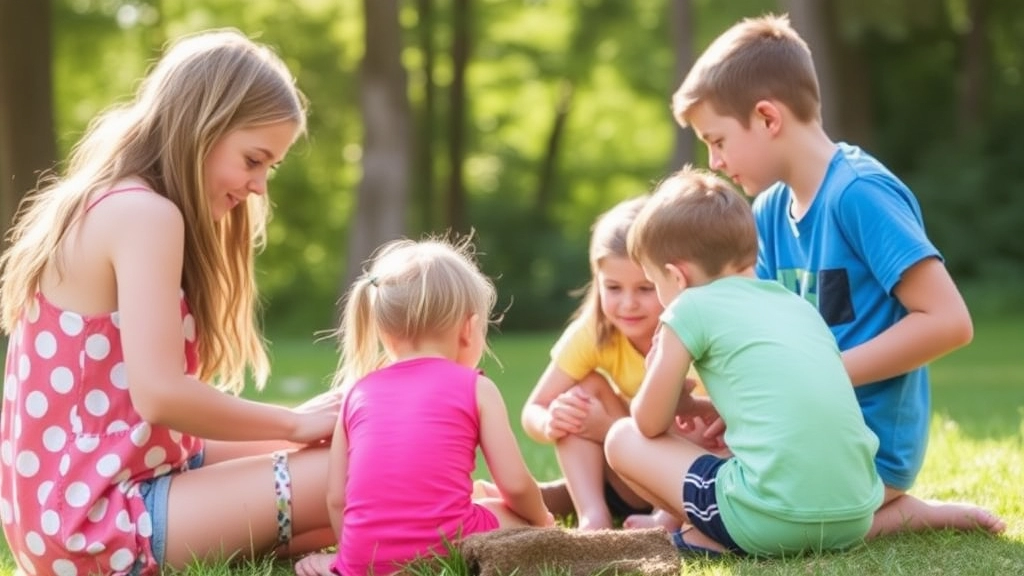
Ever wondered, “How much is this summer camp going to set me back?”
You’re not alone.
Figuring out the cost and budgeting for summer camp can feel like a maze.
But hey, let’s break it down.
The Basics: What’s the Damage?
First off, summer camps can range from £100 to £1,000+ per week.
Yeah, that’s a big range.
It depends on a bunch of factors like:
- Type of camp: Day camp? Residential? Specialty?
- Location: Camps in popular spots cost more.
- Duration: A week? Two weeks? A whole month?
Hidden Costs: What They Don’t Tell You
Now, beyond the basic fee, there are sneaky extras.
Think:
- Travel expenses: Getting to and from camp.
- Gear and supplies: Special equipment, clothing, or bedding.
- Activity fees: Some camps charge extra for certain activities.
Budgeting Tips: Keep Your Wallet Happy
Alright, so how do you budget for this?
Here’s what I do:
- Set a cap: Decide your max budget upfront.
- Research: Look up camps that fit within your range.
- Plan for extras: Always add a buffer for unexpected costs.
Financial Aid: Don’t Miss Out
Many camps offer scholarships or financial aid.
Seriously, don’t skip this part.
Check if the camp has any assistance programs.
Real Talk: Is It Worth It?
You’re probably thinking, “Is all this money worth it?”
Short answer: Yes.
The experiences, skills, and friendships your kid gains are priceless.
But hey, don’t just take my word for it.
Ask other parents, read reviews, and weigh the pros and cons.
Final Thoughts: Make It Work
At the end of the day, it’s all about making it work for you.
Summer camp is an investment in your child’s growth.
So, whether you’re splurging or saving, just make sure it’s the right fit.
Got any more questions about budgeting for summer camp?
Drop them in the comments below!
Tips for First-Time Campers
Ever wondered what it’s like to go to summer camp for the first time?
Feeling a bit nervous or unsure?
Don’t worry, we’ve got you covered.
Here are some top tips to make your first summer camp experience amazing.
Pack Smart
You don’t want to overpack, but you also don’t want to forget essentials.
Here’s a quick list:
- Comfortable clothes: Think layers. The weather can change.
- Sturdy shoes: You’ll be on your feet a lot.
- Toiletries: Toothbrush, toothpaste, soap, shampoo.
- Bedding: Sleeping bag or sheets and a pillow.
- Sunscreen and bug spray: Trust me, you’ll need these.
Make Friends Fast
The first day can be daunting, but everyone’s in the same boat.
Tips to break the ice:
- Smile: It’s universal.
- Introduce yourself: Simple and effective.
- Join activities: The easiest way to meet people.
Stay Organised
A messy space can stress you out.
Keep your area tidy:
- Use a checklist: Keep track of your stuff.
- Label your belongings: Avoid mix-ups.
- Daily clean-up: Just 5 minutes can make a difference.
Embrace New Experiences
Summer camp is all about trying new things.
Don’t be afraid to:
- Try new activities: You might find a new passion.
- Ask questions: Everyone starts somewhere.
- Step out of your comfort zone: Growth happens here.
Stay in Touch with Home
Feeling homesick?
Ways to stay connected:
- Write letters: Old school but effective.
- Phone calls: If allowed, a quick call can help.
- Photos: Bring a few from home.
Look After Yourself
Your health is important.
Remember to:
- Stay hydrated: Drink plenty of water.
- Eat well: Don’t skip meals.
- Rest: Get enough sleep.
Safety First
Know the rules and follow them.
Safety tips:
- Buddy system: Never go anywhere alone.
- Know emergency contacts: Camp counsellors, first aid.
- Listen to instructions: They’re there for a reason.
Enjoy Every Moment
Camp flies by, so make the most of it.
Tips to maximise fun:
- Be present: Put away your phone.
- Participate fully: Dive into activities.
- Make memories: Take mental snapshots.
Remember, your first summer camp is a unique experience.
Enjoy it, learn from it, and most importantly, have fun.
Got any more questions about summer camp? Check out our Judson Robinson Summer Camp guide for more tips and tricks.
Ready for an adventure? Your summer camp awaits!
FAQs About Summer Camps
What is Summer Camp?
Summer camp is a supervised program for children or teenagers conducted during the summer months. Children and adolescents who attend summer camp are known as campers.
What Types of Summer Camps Are Available?
There are various types of summer camps to suit different interests and needs:
- Traditional Camps: Offer a mix of activities like sports, arts and crafts, and nature hikes.
- Specialised Camps: Focus on specific interests such as arts, science, or sports.
- Adventure Camps: Include activities like rock climbing and white-water rafting.
- Academic Camps: Focus on subjects like maths, science, and literature.
- Day Camps: Offer daytime activities without overnight stays.
- Faith-Based Camps: Incorporate religious teachings and activities.
- Special Needs Camps: Designed for children with physical or developmental challenges.
- Family Camps: Allow parents and kids to experience camp together.
- Eco Camps: Focus on sustainability and nature education.
What Are the Benefits of Attending Summer Camp?
Attending summer camp offers numerous benefits including:
- Building Confidence: Kids step out of their comfort zones and try new things.
- Making Friends: Camp is a great place to form lifelong friendships.
- Learning New Skills: From archery to coding, camps offer a variety of skills.
- Independence: Being away from home teaches self-reliance.
- Physical Activity: Camps encourage kids to be active and enjoy the outdoors.
How Should I Prepare for Summer Camp?
Preparation is key to a successful camp experience. Here are some tips:
- Packing List Essentials: Pack clothing for all weather, toiletries, bedding, and other essentials.
- Label Everything: Avoid mix-ups by labeling all items.
- Health and Safety: Inform camp staff of any allergies or medical conditions and pack necessary medications.
- Mental Prep: Discuss what to expect and encourage excitement.
- Communication Plan: Know the camp’s policy on phone use and plan accordingly.
- Practice Independence: Encourage kids to do chores, pack their bags, and make small decisions.
How Much Does Summer Camp Cost?
The cost of summer camp can vary widely:
- Basic Costs: Camps can range from £100 to £1,000+ per week.
- Hidden Costs: Include travel expenses, gear, and activity fees.
Are There Ways to Budget for Summer Camp?
Yes, budgeting tips include:
- Set a Cap: Decide your maximum budget upfront.
- Research: Look for camps that fit within your budget.
- Plan for Extras: Add a buffer for unexpected costs.
Is Financial Aid Available for Summer Camps?
Many camps offer scholarships or financial aid. Check if the camp has any assistance programs available.
Is Summer Camp Worth the Cost?
Yes, the experiences, skills, and friendships gained at summer camp are invaluable. It’s an investment in your child’s growth.
References
-
Types of Camps – American Camp Association
-
The Benefits of Summer Camp – Parenting.com
-
How to Budget for Summer Camp – Care.com

